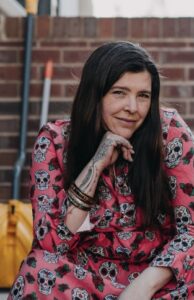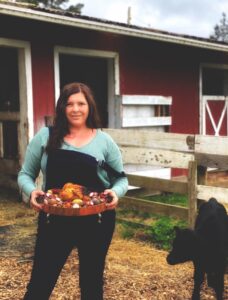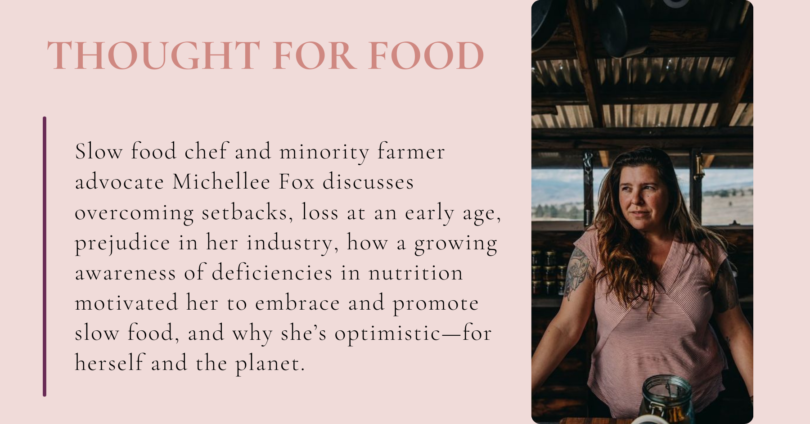World Food Day was last weekend, so we naturally thought of turning to world-renowned chef (and member of The State of Women Podcast Network) Michellee Fox for some food for thought.
The Washington-based Brazilian chef has been discouraged  by personal loss as well as the state of nutrition in the United States and elsewhere but remains confident and optimistic, a perspective she attributes to decades of work and the potential she sees for the future.
by personal loss as well as the state of nutrition in the United States and elsewhere but remains confident and optimistic, a perspective she attributes to decades of work and the potential she sees for the future.
It’s an outlook we felt resonated with sentiments often expressed by the United Nations as they observe World Food Day each year to mark the founding of the UN Food and Agriculture Organization: “Our actions are our future.”
Fox is a slow-food chef, advocate for minority and women farmers, and leading voice in a revolution to recognize and address shortcomings in food production and nutrition. Her earliest years were shaped by loss no child should endure, but they would begin to forge her passions, values, and the communities she would embrace and nurture.
Early hardships
Fox’s mother, a single parent since a year after her 1979 birth, died in a car accident when Fox was 4 years old. She lived with her maternal grandmother, where she learned a love of cooking: taught, Fox said, “to start my training to become a good wife.”
The death of her grandfather at 11 devastated Fox and brought more upheaval. Still, she found a sense of belonging soon after, living with her maternal aunt and cousins.
“I felt like a part of a family in the ‘90s,” she said. But the turmoil of her early years left a mark.

“The uncertainty of my young life has … made me prepared to face anything in life, head always above water,” she said of the attitude she adopted. “The feeling that ‘That is not so bad’ and also that I always need to please people so they will ‘like’ me.”
Fox’s childhood loss informed her determination and motivation, but she had additional factors bolstering her: her own resilience and an openness to new experiences, among others. She also had that early and growing knowledge of the importance of nutrition—shown by a growing body of evidence to play a large role in mental as well as physical health.
Fortitude, family, finding focus
From an early fascination with English—translating Bob Marley songs at 8—to an exchange program at 16, Fox nurtured a love for new experiences and a certain gritty, outspoken moxie. Her role as an early girl skateboarder in Brazil, combined with English proficiency, led Fox to an association with World Cup Skateboarding as an event translator. She would go on to co-found Violet Flame Skateboarding Events with a friend and create two major festivals.
Within a few years, she moved to the United States, had a son, and began her culinary career—returning to her roots even as she planted new ones.
“I worked my way up and used my grandmother’s teachings to shape my career,” she said.
Knowledge and dedication helped, but they didn’t make her job or career advancement easy.
“Long work days, no insurance, working weekends and being a single mother was extremely difficult,” Fox said.

She also had to deal with sexism in a career that places a higher “likability” requirement on women than men in and out of the kitchen.
“The male-dominated industry and the verbal abuse in the kitchen was something I fought from the beginning,” she said. It led to many lost jobs, but Fox said she “kept my head above water and always had the next job to try on.”
As her son started attending school—and eating the often-notorious school lunches—she found herself compelled to speak out and to act once again. After a brief stint as a “lunch lady,” Fox left the San Francisco area after six years and jobs at top restaurants for the more secluded forests of Humboldt County, where she became “a cannabis farmer and a chef on the side.”
It was during this time, Fox said, that she discovered the amount of plastic and unsustainable or potentially harmful materials used in typical farming. The revelation would crystallize her focus, which continues today.
Slowing down, branching out, and looking forward
Now Fox lives with her husband on “a 90-acre farm in the middle of nowhere, Washington.”
“Here I met a community that lives … from things they grow, preserve, and hunt,” she said.

The community and lifestyle were a perfect match for the chef’s own focus on slow food—a movement with heavy emphasis on sustainability, locally grown food, and local food cultures and traditions. The approach focuses on the importance of slowing down, to savor food (and life). Bulk production and “fast” food (that may nevertheless have traveled thousands of miles to be available in a snap) is out; low-impact farming and fresh ingredients are in.
The idea, Fox said, is to focus on how the ingredients from the land nurture us and our responsibility to nurture the earth in return. She continues to teach and learn—about slow food, regenerative farming, and more—and feels optimistic about the future.
“I really am [optimistic],” she said “I think the ‘foodie revolutions’ and now the ‘COVID revolutions’ have shown people that our systems are fragile, that we depend on others to eat, and that we need to start figuring out how to contribute and be more self-sustainable.”
It’s a long journey from the small child who didn’t understand what had just happened to her—or the life she would go on to build.
“I don’t remember much of my childhood, but every day I try to honor that little girl: confused, grieving, left in the corner of the love others could spare.”

To learn more about Michellee Fox, find her on Instagram or Twitter and check out the CraftFood Podcast.
To learn more about slow food, visit Slow Food International.
Images provided by Michellee Fox.







